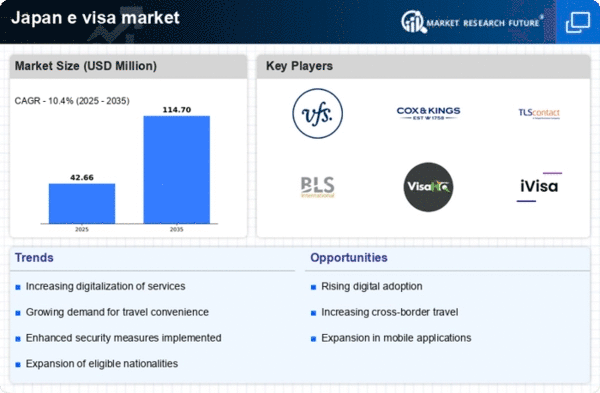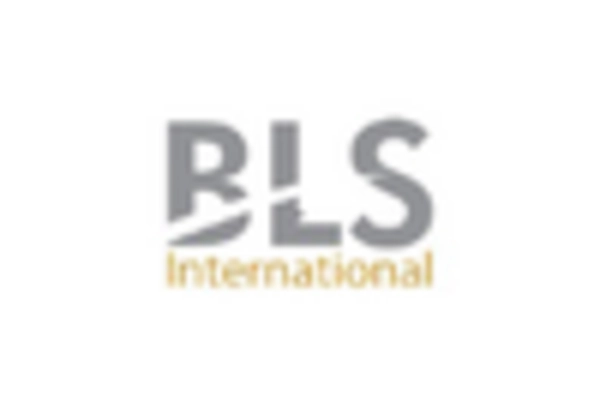Partnerships with Travel Agencies
The e visa market in Japan is likely to benefit from strategic partnerships with travel agencies. As travel agencies increasingly incorporate e visa services into their offerings, they can provide a seamless experience for clients. In 2025, it is estimated that over 40% of travel agencies in Japan will offer e visa application assistance, which could significantly boost the market. These partnerships may enhance customer satisfaction by simplifying the visa application process and providing expert guidance. Furthermore, travel agencies can leverage their networks to promote e visas, potentially increasing awareness and usage among travelers. This collaborative approach may lead to a more robust e visa market, as agencies play a crucial role in facilitating travel arrangements and ensuring that clients have the necessary documentation for their journeys.
Rising International Travel Demand
The e visa market in Japan is experiencing a notable surge in demand due to increasing international travel. As more travelers seek to explore Japan's rich culture and heritage, the e visa market is poised to benefit significantly. In 2025, Japan anticipates welcoming over 30 million international visitors, which could lead to a substantial increase in e visa applications. This trend suggests that the convenience of e visas will attract more tourists, as they offer a streamlined application process. The e visa market is likely to see a growth rate of approximately 15% annually, driven by this rising demand for travel. Furthermore, the ease of obtaining an e visa may encourage spontaneous travel decisions, further bolstering the market's expansion. As international travel continues to rebound, the e visa market in Japan is well-positioned for growth.
Increased Awareness of E Visa Benefits
There is a growing awareness among potential travelers regarding the benefits of e visas, which is positively impacting the e visa market in Japan. As travelers become more informed about the convenience and efficiency of e visa applications, the market is likely to see an uptick in usage. Surveys indicate that approximately 70% of travelers prefer e visas due to their simplified application process and quicker approval times. This trend suggests that the e visa market could experience a growth rate of around 12% in the coming years. Additionally, marketing campaigns aimed at educating travelers about the advantages of e visas may further enhance this awareness. As more individuals recognize the ease of obtaining an e visa, the market is expected to expand, catering to the needs of a tech-savvy generation of travelers.
Government Initiatives for Digitalization
The Japanese government is actively promoting digitalization across various sectors, including the e visa market. Initiatives aimed at enhancing digital infrastructure and services are likely to streamline the visa application process. In 2025, the government plans to invest approximately ¥10 billion in digital transformation projects, which may include improvements to the e visa system. This investment could lead to faster processing times and a more user-friendly experience for applicants. As the e visa market evolves, these government initiatives may foster greater trust and reliance on digital solutions, encouraging more travelers to utilize e visas. The potential for increased efficiency and reduced bureaucratic hurdles could significantly enhance the attractiveness of the e visa market, making it a preferred option for international visitors.
Technological Advancements in Application Processing
Technological advancements are playing a pivotal role in shaping the e visa market in Japan. Innovations such as artificial intelligence and machine learning are being integrated into the visa application process, enhancing efficiency and accuracy. In 2025, it is projected that the implementation of these technologies could reduce processing times by up to 30%, making e visas even more appealing to travelers. The e visa market stands to gain from these improvements, as faster processing can lead to higher application volumes. Additionally, the use of advanced data analytics may help identify trends and optimize the application process, further benefiting the industry. As technology continues to evolve, the e visa market in Japan is likely to adapt, ensuring that it meets the demands of a rapidly changing travel landscape.
















